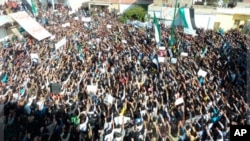Thousands of Syrian army deserters who joined the country's opposition movement have been staging more frequent and deadly attacks on forces loyal to President Bashar al-Assad in recent days.
Those offensive operations by the lightly-armed and loosely-organized Free Syrian Army have increasingly militarized what has been a largely peaceful eight-month uprising against the government.
In recent weeks, the rebels engaged in battles with pro-Assad troops in the northwestern province of Idlib, central province of Homs and southern province of Daraa.
On Wednesday, the Free Syrian Army escalated the fighting by attacking military facilities on the outskirts of the capital, Damascus for the first time.
Syrian opposition activists say the rebels struck an air force intelligence complex in the suburb of Harasta with rockets and gunfire.
Watch a related report by Elizabeth Arrott
Chris Phillips, a Syria expert with the Economist Intelligence Unit in London, says the air force base is notorious for using repression to prevent dissent within the military.
He says he believes the attack on the base was a symbolic effort by the rebels to intimidate pro-Assad forces rather than an attempt to seize facilities controlled by the much stronger military.
|
A Look At Syria's Main Opposition Groups
|
Phillips also says the Syrian rebels have been emboldened in recent days by the Arab League's decision to suspend the Syrian government's membership and by Jordanian King Abdullah's call for Assad to step down.
He says the rebels have interpreted those moves as an opportunity to bring their fight to the capital, which has been largely quiet since the uprising began in March.
"I believe that by attacking the outskirts of Damascus, they're trying to send a message to the, for want of a better word, undecided people in Damascus - to let them know that this is going to start affecting their lives as well, and now is the time to join the uprising, to play their cards," said Phillips.
The Free Syrian Army released a statement late Tuesday saying that it has formed a temporary military council whose goal is to weaken the Syrian security forces.
But Phillips says the rebels have given mixed messages in the past week about their desire to militarize the uprising, indicating that they remain fragmented.
"We're talking about a lot of different pockets of people, rather than a clear, structured, united command," he said.
Phillips says the Syrian rebels do not appear ready to engage in the kind of armed rebellion that overthrew Libyan leader Moammar Gadhafi.
The Syrian military has not yet seen whole units or generals defecting to the opposition as they did in Libya. And the Syrian rebels do not control a territory. Libyan transitional forces used the city of Benghazi as a launching point for their rebellion that grew out of a largely cohesive opposition base.
Syria's opposition is fragmented into at least three groups.
|
VOA's Elizabeth Arrott speaks with Syria analyst Nadim Shehadi via Skype about the attacks and what they mean for activists advocating peaceful protest:
|
Nadim Shehadi, an associate fellow of the London-based Chatham House, says divisions will hinder a united militarized movement to civil war.
"The opposition narrative - the dominant opposition narrative - is still that of a non-violent and peaceful protest," he says.
And, Shehadi adds, that makes international military moves less likely.
"The Syrian National Council has sent a document to the Arab League and to the U.N. appealing for the protection of civilians under the duty-to-protect laws which is a universal obligation under U.N. rules, so there is a call for protection of civilians, under the duty to protect but it is different than calling for a foreign military intervention as we understand it," he says.















